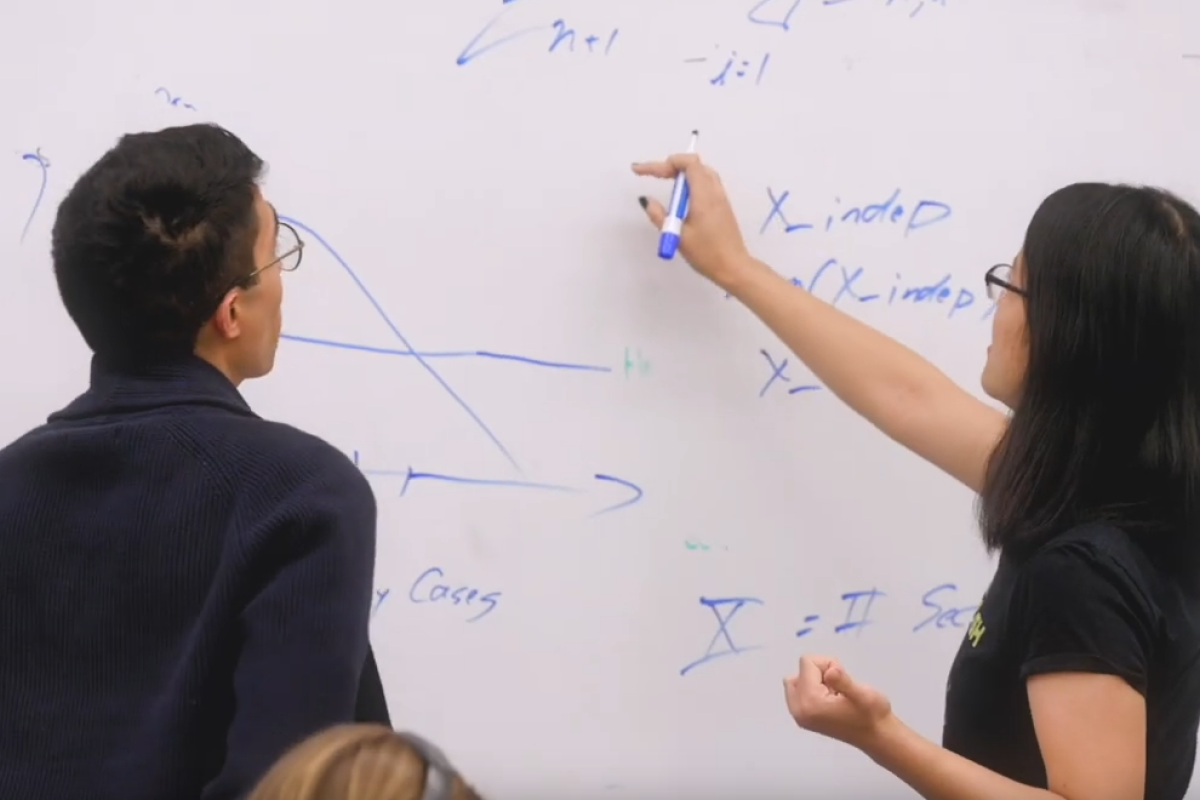STORY: Q&A with Assistant Professor Zach del Rosario ’14
April 11, 2024
“Olin taught me to always think about people, rather than just think about things.”
Zach del Rosario ’14, Olin alum and Assistant Professor of Engineering and Applied Statistics, answers a few questions about his recent work in the intersection of engineering, statistics, and education research.

Image of Assistant Professor Zach del Rosario ’14 working on ModSim with an Olin student.
Q: How long have you been teaching at Olin and what are you teaching these days?
A: I'm a "dual citizen" of engineering and statistics, so I teach courses related to data and models. In particular, I've been teaching Data Science and ModSim since I started teaching at Olin in the Fall of 2020.
Q: You recently published two new papers. What do they explore?
A: I brought an engineer's view to statistics education with my recent Journal of Statistics and Data Science Education article. I studied engineering practitioners and described their professional practices. This study showed that, when it comes to data, we can't just think about patterns, safe engineering requires us to think about consequences too.
I've also written for The Conversation an "explainer" of the average: Where it comes from, why it's useful, and what are some of its limitations. We first learn about the average in grade school, but we almost never talk about what we leave out when we compute an average. It turns out the average revolutionized science, but over-reliance has led to both discrimination and injury.
Q: Why is this research important?
A: My work helps educators teach students how to work with data effectively. Especially when we're making consequential decisions—like designing bridges or aircraft—we have to grapple with what happens if things are not exactly the way we assume. Traditional engineering tends to ignore the uncertainty that comes through data. Statisticians are experts at handling uncertainty, but they don't think about consequences in the same way engineers do. My work integrates the two perspectives to support safe engineering with data science.
Q: How does your research differ from previous data science research?
A: A lot of work in data science is focused on how we identify stable patterns in data. That work is useful for deciding whether what we're seeing is due to signal or just due to noise. But if the "noise" we're seeing is something that can cause injury, we can't just dismiss it. My work focuses on consequences and how we do data science to handle those consequences.
Q: Do you think your Olin education played a role in how you think about data science differently?
A: Olin taught me to always think about people, rather than just think about things. I actually used the (UO)CD "playbook" when I was a graduate student, and took an engineering internship over a summer so I could interview practitioners to help get ideas for my PhD thesis. I managed to discover a decades-standing assumption in aerospace design that leads to elevated passenger risk—this had gone unnoticed since the 1960s, partly because aerospace engineers were content to make the same assumptions as their predecessors. Olin taught me to enter the field with an open mind but not an empty head—that's been a successful strategy throughout my career.
Q: Was there a moment when you knew you wanted to be a teacher instead of an engineer in industry?
A: Working as a teaching assistant at Olin was the single most compelling thing I did. I went to graduate school because I wanted to be a professor. I've been working towards that goal since my early 20s, so I'm thrilled to be here on the Olin faculty now.
Q: What is the AAC&U's Liberal Education magazine and what is your new role there?
A: The AAC&U is a voice for liberal education—in the sense of liberty. A liberal education is meant to liberate the person through the empowerment of critical thinking and reasoning. Liberal Education is their flagship magazine—it's a piece that higher education administrators (deans, provosts, presidents) read to keep a pulse on the conversation in higher ed. As a member of the editorial advisory board, I will help steer the magazine to highlight topics that are relevant to colleges and universities across the country.
Q: How did you get connected with this opportunity at the magazine?
A: I was a 2020 K. Patricia Cross Future Leaders scholar, which is administered by the AAC&U. It's an award that is meant to identify and support potential leaders in higher education. Since then, I've been involved with the AAC&U mostly as a writer; I wrote a piece about Olin's Faux-mencement in 2020, and another piece on Design Refusal for Liberal Education. They seemed to really like the design refusal piece—enough that they asked me to join the editorial advisory board!
Q: What are you looking forward to and hoping to accomplish in this role?
A: There's a lot that engineers can learn from humanities scholars, but the street runs both ways. In the design refusal piece I wrote about my lived experience as an engineer and how it made me blind to certain "moves"—things like refusing to carry out a design that can't be done ethically. Given that so many societal problems are either affected or directly related to technology, having an engineer contributing to Liberal Education is key. I'm looking forward to bringing my technical perspective—and learning from my colleagues on the board!